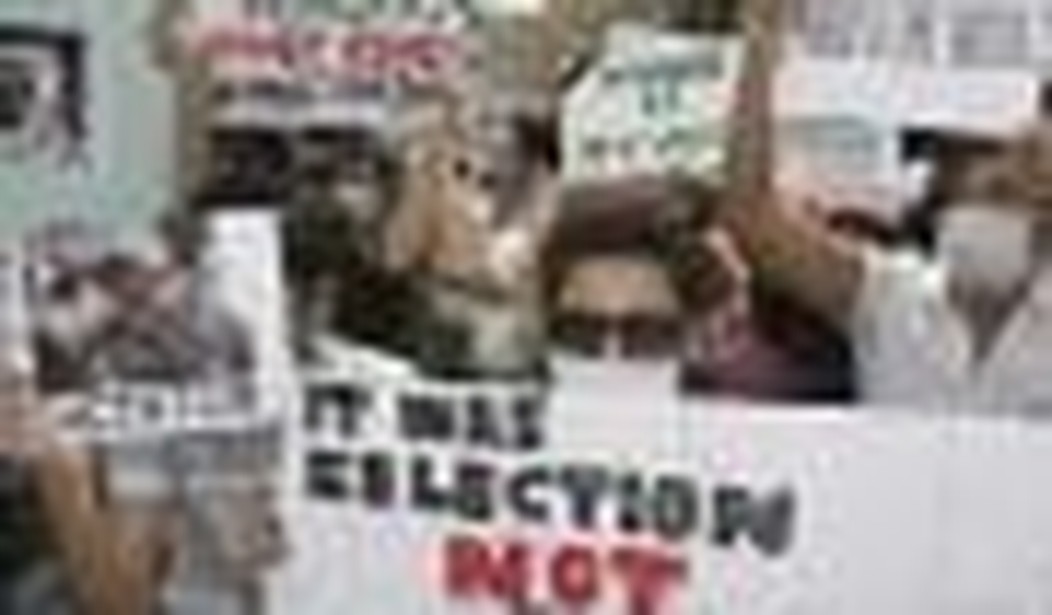Natan Sharansky believes every dictatorship shares certain inherent similarities. In his book The Case for Democracy, the former Soviet dissident explains how there are three groups of people in all totalitarian societies: the true believers, those who support the ideology of the regime; the dissidents, those who actively resist and oppose the regime; and the double-thinkers, those who reject the legitimacy of the regime but are unwilling to openly protest for fear of retribution. “The bulk of the population are double-thinkers,” Sharansky states. “That means people who already have problems, or doubts, or are in deep disagreement with the regime, but are afraid to express it,” the onetime political prisoner clarifies.
That is what now appears to be happening across Iran in response to this blatantly rigged election: the once-intimidated double-thinkers are becoming proactive dissidents. The shadowy clerics who rule Iran brazenly undermined the facade of fair elections and reappointed their puppet Mahmoud Ahmadinejad to the presidency. Calling the “reelection” of Ahmadinejad a “divine assessment,” Supreme Leader Ayatollah Khamenei shamelessly ignored his own phony electoral rules and reinstalled his presidential stooge in one of the most palpable and indisputable hijackings of democracy since 1933. In response, the entire nation is rioting and on the precipice of insurrection — even revolution, one could only hope.
Hundreds of thousands of Iranians have taken to the streets chanting “Death to the dictatorship!” and “We want freedom!” Some accounts have said the number of protesters could be as high as three million. In retaliation, the regime has blocked cell phone service and text messaging, shut down gas stations, and blocked Facebook, YouTube, and other networking websites. Certain television stations and opposition newspapers have been shut down — to which Ahmadinejad coldly replied, “Newspapers come and go. Don’t worry about it.” Foreign journalists have been kicked out of the country. Revolutionary Guard thugs have taken to the streets as well, as have regime-loyalist Basij paramilitaries who are out in full force beating, clubbing, machete-slicing, tear-gassing, shooting, arresting, and killing the protesters. One report said upwards of 100 people were killed in Tehran alone. That number is unconfirmed, however.
Should these protests be nurtured and encouraged to proceed to their logical conclusion, this could turn into the best development to come out of the Middle East in sixty years. Should the protesters and rioters be aided, our greatest adversary could become one of our greatest allies overnight. This is a perfect opportunity to advantageously exploit. But how is the United States responding?
Vice President Biden said, “We’re going to withhold comment.” Secretary of State Clinton said, “The United States has refrained from commenting on the election in Iran.” The State Department has refused to condemn the regime’s brutal crackdown. Press Secretary Gibbs said, “Like the rest of the world, we were impressed by the vigorous debate and enthusiasm that this election generated, particularly among young Iranians. We continue to monitor the entire situation closely, including reports of irregularities.” One unnamed White House official said, “There’s no reason to think the [Iranian] regime is not in control.” Another said, “[The election result] might also cause engagement to proceed more swiftly.”
This is no time to “withhold” or “refrain from comment.” It is not a time to be “impressed” with Iran’s “enthusiasm” or to “monitor irregularities” in what was an obvious charade. It is not a time to reconfirm this decrepit regime’s “control” over its oppressed people — knocking the righteous wind out of every dissident’s sails — or to offer pie-in-the-sky scenarios about diplomatic “engagement” at some future date. The big-thinkers in the administration aren’t thinking all that big. Who in their right mind is now worrying about “what this means for diplomacy” when the Iranian government itself might not even exist next week?
President Obama’s silence is deafening. This will undoubtedly be considered the most important moment of his first term and he is as quiet as a lamb. According to reports, Obama has received updates on the situation in Iran but “did not convene any high-level White House meetings or conference calls.” Like so many times throughout his short and unlettered Chicago career, Obama has once again decided to vote “present.” Except this time, the issue is not some mundane community organizing red-tape dilemma. The issue is the lifespan of the Islamic Republic of Iran, the world’s largest state sponsor of terrorism, and the future of war and peace in Southwest Asia.
Where is the condemnation of Ahmadinejad? Where is the criticism of Khamenei? Where is the denunciation of this stolen election? Where is the show of support and solidarity with the protesters? Where is the rhetorical support for the dissidents and democracy? Better question: where is President Obama, the man who campaigned and effeminately talked the talk about “soft power” until our ears bled?
His administration’s jelly-spined non-judgmentalism has devolved into impotent and delusional relativism, and his personal hesitancy to condemn theocracy and tyranny — his tentativeness to actually lead and side with Iran’s democrats and dissidents — is intellectual nonsense and moral confusion of the highest order. This is now an administration more eager to unleash venom-laced tirades against domestic critics and private citizens like Rush Limbaugh than against women-beating, election-rigging, theocratic murderers in the Middle East. Where else can one find a moral compass so askew and so detached from the real world?
Before this “election,” those of us forever suspicious of the terrorists ruling Iran suspected they were up to one of two ploys. Either the mullahs were planning to let the “moderate” Mousavi win and thereby con the world into seeing a “happy face” on the true nature of their regime — to ease sanctions and buy time to acquire nuclear weapons — or the mullahs were using Mousavi’s candidacy to “lure out” the domestic opponents of the regime. The latter theory seems to be the correct one. Ahmadinejad was always the preferred choice for the Islamic establishment; Mousavi was merely a sop to the masses, forever destined to lose. His supporters thought they were participating in an open and legitimate political process; it was more like a flytrap. Mousavi’s loss was designed to identify the leaders of Iran’s underground dissident community and that is precisely what it accomplished.
And now these dissidents are out in the open fighting for their lives and for their country. We should be assisting them. These young Iranians are our kindred spirits, our friends, and are sticking their necks out in hope that we will find it within ourselves to lend material, technical, financial, and moral support. In their own words, they are “doomed” if President Obama recognizes Ahmadinejad’s victory. Amidst his silence, they have no idea what to expect. Neither do we.
President Obama is planning to crisscross the country this summer in an attempt to sell his health care plan to the public. He would be better off selling the idea of true health care for the world: the downfall of the mullahs and freedom in Iran.









Join the conversation as a VIP Member